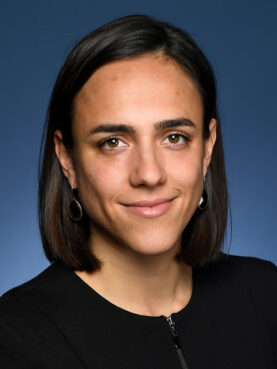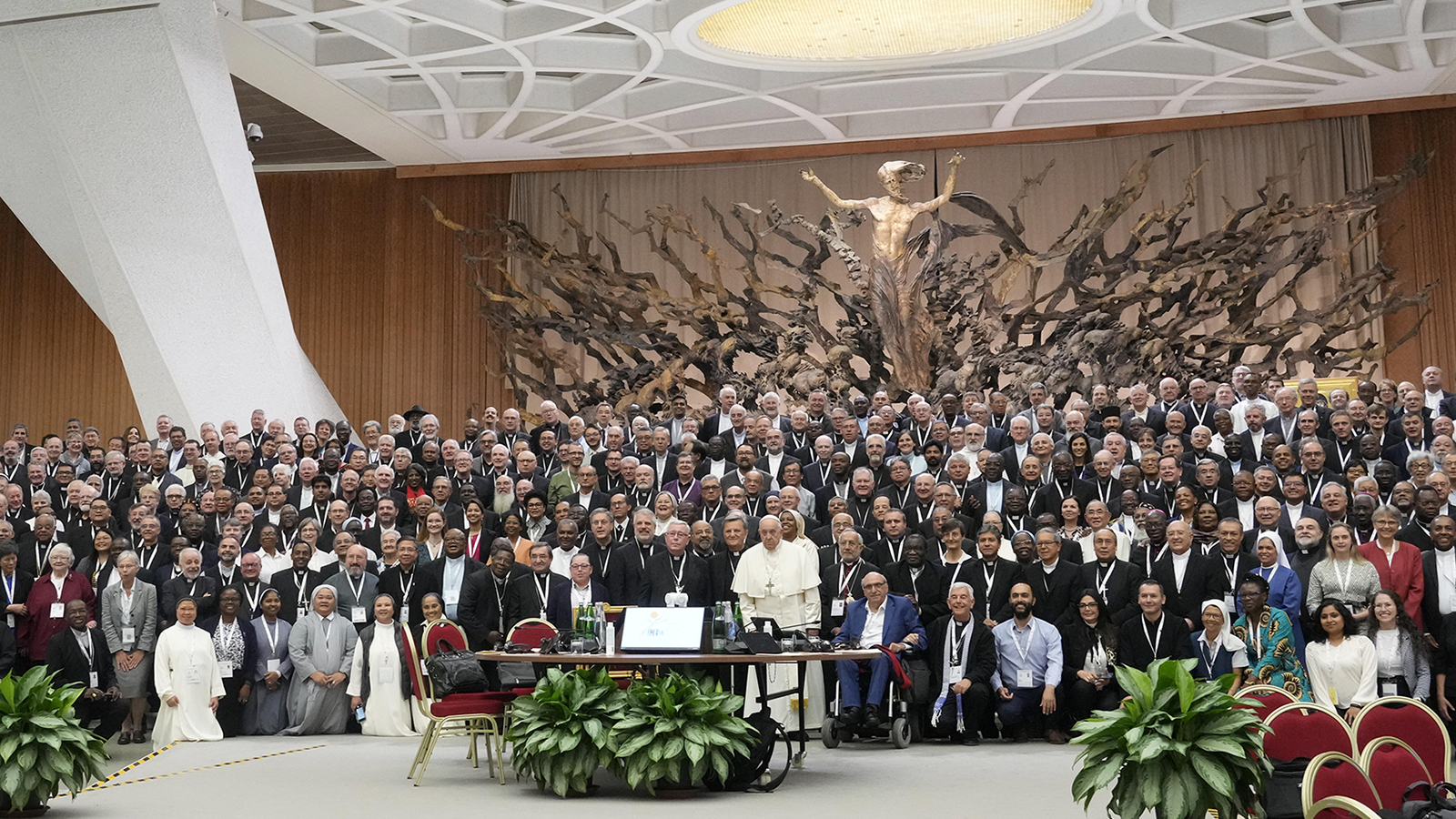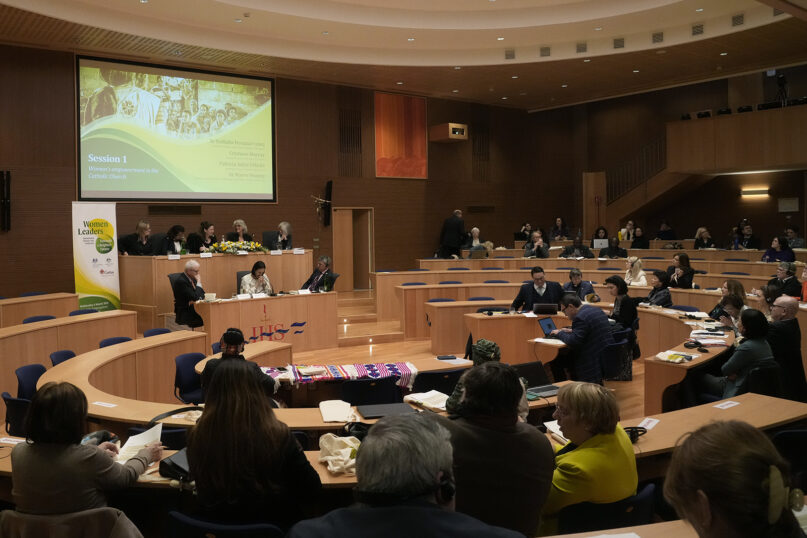VATICAN CITY (RNS) — In the week leading up to International Women’s Day, Catholic women gathered near the Vatican and online to promote female leadership in the Catholic Church, demanding equality and visibility while urging the institution to set its fears about change aside.
“It’s so important that the Catholic Church be engaged in this issue, not just internally, but also externally given the contribution they make in the education sphere and the health care sphere,” Chiara Porro, Australia’s ambassador to the Holy See, told Religion News Service on Wednesday (March 6).
Acknowledging that in her four years in Rome the Vatican has taken significant steps forward, with high-ranking Vatican positions being filled by women, Porro represents a country that “has a very strong agenda in empowering women and women in leadership,” she said, “including in our own foreign service, which like the Catholic Church has been very male dominated for a very long time.”
She said her female colleagues — the number of women ambassadors to the Vatican has risen to 40 — talk about the issue of women’s influence often. “It’s an incredible group, an informal group, and we come from many different areas of the world. We support each other, we share ideas, we network,” she said.
Pope Francis has supported the trend, she said, meeting with the female ambassadors last year on International Women’s Day.

Chiara Porro. (Photo by Penny Bradfield AUSPIC/DPS)
Porro works closely with the International Union of Superiors General, the leaders of the world’s religious orders, to put a spotlight on the work nuns do, especially in the poorest places in the world. But their focus goes beyond Catholicism. This week, the embassies of Australia, France and the Netherlands, all woman-led, sponsored “Women Sowing Seeds of Peace and Cultivating Encounter,” a conference of Christian, Jewish, Buddhist and Hindu female faith leaders.
“When we talk about interfaith dialogue, when we talk about religious leaders coming together, we find that a lot of the religions around the world are led by men, so it’s really important to bring female faith leaders together,” Porro said.
On Thursday, women theologians, experts and leaders met for a one-day discussion on female leadership, asking the tough questions facing the Catholic Church on the issue. In her presentation, ordained missionary and theologian Maeve Louise Heaney questioned Catholic theology that attempts to “essentialize” women. “They speak of complementarity and name the contribution of women as essentially different to that of men,” she explained, “pitching love, spirituality and nurturing against authority, leadership and intellect.”
Heaney challenged Catholics to reconsider their idea of God and the Holy Spirit as neither male nor female, quoting her “yoga-loving” niece who prays to “the Father, the Son and the Holy Spirit. And the Mother, the Daughter and the Holy Spirit.”
A 2022 survey of 17,200 women in 104 countries by the international forum Catholic Women Speak found that two-thirds of women in the church support “radical reform,” with 29% saying they will consider leaving the church if women aren’t given more prominence.
In her interview with RNS, Heaney recognized that the church, “like any big ship, moves slowly,” adding, “We don’t have a time frame.” She took encouragement, she said, from Francis’ Synod on Synodality, born from a massive consultation of Catholics on hot-button issues including female empowerment and LGBTQ inclusion, which will hold its second session at the Vatican in October.

Pope Francis poses for a picture with participants of the Synod of Bishops’ 16th General Assembly in the Paul VI Hall at the Vatican, Oct. 23, 2023. (AP Photo/Gregorio Borgia)
She also supports the discussions underway at the Vatican about allowing women to be ordained as deacons, who can preach at Mass but cannot perform some other priestly functions, such as consecrate Communion or hear confessions.
“I think the people have a right to hear women preaching,” Heaney said. “There are spaces in which the best person to speak on a theme would be a woman. And I think a theological, doctrinal and canon law structure could open spaces for that to happen.”
According to Heaney, there are no theological barriers to ordaining women as deacons, nor would women deacons present any difficulty in terms of the church’s organization. What stands in the way, she said, is the fear that allowing women deacons would bring women closer to the altar, the priests’ dominion.
“Fear is a bad adviser,” she said. “What if we gave the church that? What if we allowed spaces for women to preach? Under the authority of the bishop, in collaboration with the parish priest, with the proper formation like all the rest of the ministry. You might find that the issue of priesthood changes in color if we have different kinds of leadership.”
While theologians push the envelope on female leadership, women who have climbed up the Vatican administration have learned to have patience about penetrating the male-dominated bureaucracy.
“It’s a long process that has to be continued,” said Sister Nathalie Becquart, the first female secretary of the Vatican’s Synod office and a leading figure in the pope’s synodal process. “They will need more time,” Becquart said, while teasing that the Vatican might soon announce a new development on this front.
On Thursday, the Catholic charity network Caritas published “Equality, Encounter, Renewal,” a pamphlet urging its 162 affiliated Catholic charities to create spaces for dialogue about women’s leadership. In an introduction, Sister Alessandra Smerilli, the secretary of the Vatican Dicastery for Promoting Integral Human Development, laments that the “systematic social and cultural exclusion of women can also be seen when looking at the face of leadership in the world today.”
Francis, meanwhile, continues to use language that reinforces the role of women as mothers and caregivers. Speaking to organizers of the conference “Women in the Church: Builders of humanity,” taking place in Rome this week to recognize the contributions of 10 female saints, the pope said “the church is female” and women have a “unique capacity for compassion” that allows them “to bring love where love is lacking, and humanity where human beings are searching to find their true identity.”
But some women in Rome this week said that Catholic theology can often emphasize too much women’s natural inclinations, which it sees as reflecting the relationship that Christ has with his church. The women asked how this view affects the roles men and women occupy in the church.
Heaney said: “It is not easy to broaden our understanding of the One who brought us to life, as no one image will work. But we owe it to the future generations.”





